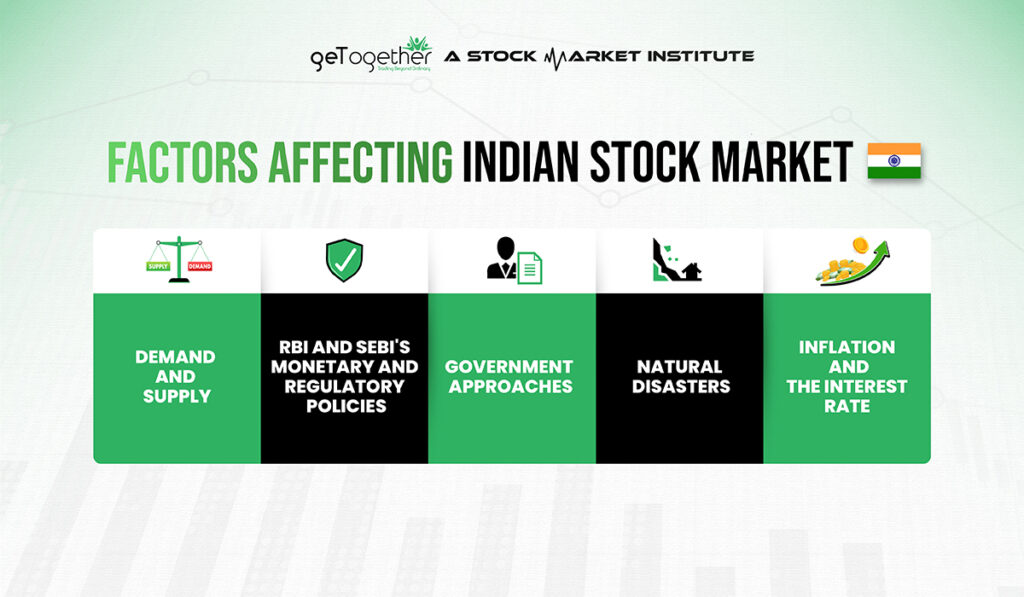The stock market is a complex and dynamic environment where fluctuating factor determines the value of a stock. As a seasoned investor, I’ve witnessed firsthand how seemingly minor events can have profound impacts on stock prices, shaping the financial landscape.

Image: www.gettogetherfinance.com
In this article, we’ll dive deep into the crucial factors that influence stock prices, providing a comprehensive understanding of this ever-evolving market. By shedding light on these driving forces, we aim to empower you with the knowledge necessary to navigate the stock market with confidence and make informed investment decisions.
Macroeconomic Factors
Macroeconomic factors exert a broad-based impact on the overall economy and subsequently on stock prices. These factors include:
- Interest Rates: Central banks’ interest rate decisions directly affect the cost of borrowing for businesses and individuals. Higher rates can lead to reduced investment and economic growth, negatively impacting stock prices.
- Economic Growth: A strong economy typically supports higher corporate earnings, which can drive stock prices upward. Conversely, sluggish economic growth can hinder corporate profits and dampen stock market returns.
- Inflation: Persistent inflation erodes the purchasing power of money, reducing the real value of corporate earnings and stock prices.
Company-Specific Factors
In addition to macroeconomic forces, company-specific factors also play a critical role in shaping stock prices:
- Earnings and Revenue: The financial performance of a company, as reflected in its earnings and revenue reports, is a primary determinant of its stock price. Consistent growth in these metrics indicates a healthy business and can drive stock prices higher.
- Management Team: The quality of a company’s management team can significantly influence its long-term success. Experienced and skilled leaders can make strategic decisions that enhance the company’s competitive position and boost stock prices.
- Competitive Landscape: The competitive intensity of an industry can impact stock prices. Companies with a strong competitive advantage and market share often command higher stock prices.
Industry Factors
The broader industry in which a company operates can also influence its stock price:
- Technological Advancements: Disruptive technologies can reshape entire industries, creating winners and losers. Companies that embrace innovation and successfully adapt to technological shifts tend to see their stock prices rise.
- Regulation and Policy: Government policies and regulations can affect the profitability and growth potential of companies in specific industries. Changes in regulatory landscapes can impact stock prices.
- Supply and Demand: The dynamics of supply and demand can influence stock prices. Factors such as changes in consumer preferences or production costs can affect the supply and demand balance and impact stock prices.

Image: www.youtube.com
Market Sentiment and Psychology
The stock market is also heavily influenced by sentiment and psychology:
- Investor Confidence: Bullish sentiment, characterized by optimism and buying, can drive stock prices upward. Conversely, bearish sentiment, marked by pessimism and selling, can depress stock prices.
- Fear and Greed: Fear and greed are powerful emotions that can lead to irrational behavior in the stock market. Panic selling during market downturns or excessive buying during bull markets can exacerbate price swings.
- Technical Analysis: Some investors use technical analysis, which involves studying historical price patterns, to predict future price movements. While technical analysis can be informative, it’s important to remember that it’s not an exact science.
Tips for Investors
Armed with this knowledge, here are some tips for investors:
- Diversify Your Portfolio: Don’t concentrate your investments in a single stock or sector. Diversifying your portfolio reduces risk and enhances overall returns.
- Stay Informed: Keep abreast of macroeconomic, company-specific, and industry news to make informed investment decisions.
- Invest for the Long Term: Stock prices tend to fluctuate in the short term. By adopting a long-term investment horizon, you can ride out market volatility and potentially reap higher returns.
FAQs
- What is the single most important factor that affects stock prices?
There is no single most important factor. A combination of macroeconomic, company-specific, industry, and market sentiment factors interact to influence stock prices.
- How can I predict stock movements?
Predicting stock movements is a complex task. While technical and fundamental analysis can provide insights, it’s important to remember that stock prices are inherently unpredictable.
Which Factors Can Affect A Stock’S Price
Conclusion
Understanding the factors that influence stock prices is crucial for navigating the complexities of the stock market. By considering macroeconomic forces, company-specific dynamics, industry trends, and market sentiment, investors can make more informed decisions and potentially enhance their returns. Remember, investing involves risk, and it’s essential to diversify your portfolio, stay informed, and invest for the long term to achieve your financial goals.
Do you have any questions or insights on the factors that affect stock prices? Let us know in the comments below.







